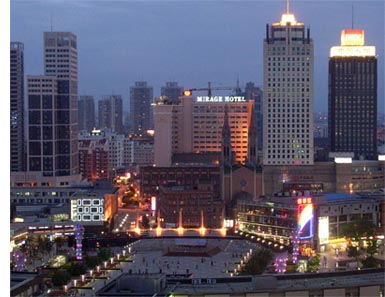Dezan Shira & Associates opens new office in Ningbo
Practice now has three offices in Shanghai’s Yangtze River Delta and nine nationally
 NINGBO, April 16 – Dezan Shira & Associates, the specialist foreign direct investment firm, has opened an office in the port of Ningbo, on China’s Eastern coast just south of Shanghai.
NINGBO, April 16 – Dezan Shira & Associates, the specialist foreign direct investment firm, has opened an office in the port of Ningbo, on China’s Eastern coast just south of Shanghai.
The practice, which provides legal, tax and due diligence advice to multinationals throughout China, Hong Kong, India and Vietnam, has maintained a large regional office in Shanghai for 14 years and a year ago established a branch in Hangzhou, the capital city of Zhejiang province and situated between Shanghai and Ningbo.
“Business in Shanghai is becoming highly competitive and many companies are more price sensitive than was previously the case,” says Olaf Griese, the firm’s regional manager. “As Shanghai moves more towards becoming a center for services, cities such as Ningbo are developing rapidly and are a major draw to foreign manufacturing investors looking at accessing Shanghai’s wealth yet without the higher cost.”
Dezan Shira & Associates have actually maintained clients in Ningbo for over ten years says Chris Devonshire-Ellis, the firm’s senior partner. “The city boasts an excellent free trade zone and deep water port capabilities,” he says. “We are pleased to finally cement a presence on the ground in the city to both provide better service to our Ningbo-based clients as well as be more active in understanding the developing dynamics of coastal East China and implement investment options for our client investor.”
Ningbo is also not just an ordinary Chinese city; it has the same authority as provincial governments for economic administration allowing it to formulate local laws and regulations. It was also one of the first major east coast cities to open to foreign trade. By 2010 the government wants the city to be an important industrial city, a major base of heavy chemical industry, a principal foreign trading port in East China and the economic centre of Zhejiang province.
The city is only 160 kilometers south of Shanghai, but has suffered for more than a century from the fact that Hangzhou Bay stands in the way. However, unlike Shanghai, it has a deepwater port, and soon, it will also have a bridge across the bay greatly improving the transport network. The 33-kilometer long Hangzhou Bay Bridge, set to open May 1, stretches across Hangzhou bay to Shanghai reducing the driving time from four to two hours.
Ningbo is an important industrial base and a major production base of grain, cotton, edible oil and aquatic products. Industries include textiles, garments, machinery, petrochemicals, iron and steel, power generation and paper-making. The city has over 80,000 enterprises. It is also considered to be the “Capital of Stationary in China” – with more than 800 companies producing one-third of China’s exported stationary products.
Both the chemical and machinery and electronic industries are thriving. The city has 12 million tons of crude oil refining capacity. It is also the largest injection molding machine production base in China, with around 50 enterprises accounting for 50 percent of the country’s annual production. Power transformation and transmission equipment is another pillar industry and city authorities plan that within three-five years the city will become the main production base for the latter industry with an annual output of RMB2 billion. Electronics is booming, too, with more than 2,000 such companies registered in Ningbo. The city is one of the three major home electric appliance production bases in China – the turnover accounts for 30 percent of China’s total in this industry. Ningbo is a leading garment manufacturing city, making 12 percent of the country’s total production – 1.4 billion suits annually. In 2007, Ningbo’s GDP was RMB343.31 billion.
Dezan Shira & Associates Ningbo office is located at Suite 505, Shiji Jingmao Mansion, 158 Baizhang Donglu, Ningbo, 315040; tel: 0574 8733 8682; email ningbo@dezshira.com. The regional manager is Lily Wang, a fluent English speaking and certified public accountant from the city with a strong background in advising multinationals on their legal and tax position in China.
- Previous Article China’s first quarter GDP up by 10.6 percent
- Next Article A Brief History of the Bank of China


























